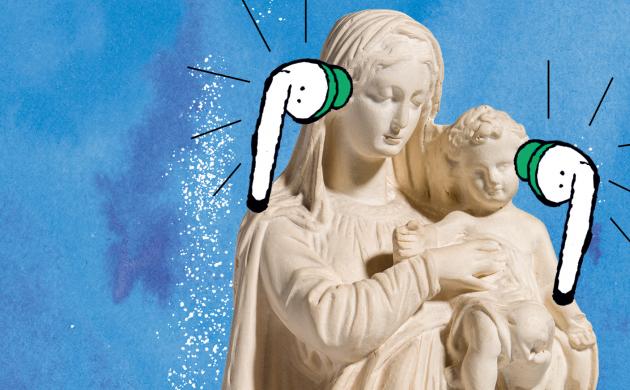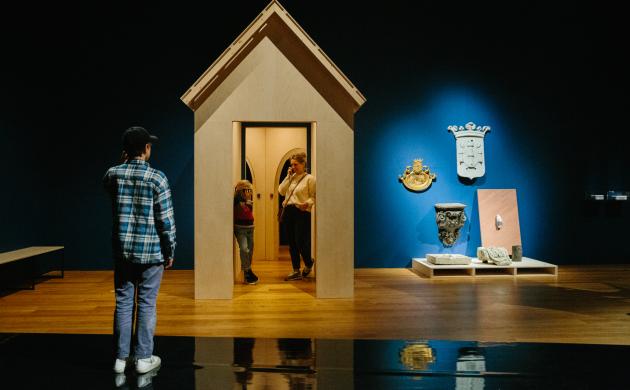Stories from the districts
Berchem
On the night of 12 to 13 January 1932, a disastrous night befell the famous German Circus Sarrasani. In those winter days prior, the circus had set up its spectacle on the military grounds in Berchem. A fire broke out in the dressing rooms and spread at breakneck pace! The fire brigade and a number of local residents arrived quickly on the scene, but everything was already ablaze. It was a cold night with strong winds, which explains its violent spread. The perfect conditions for such a conflagration.
'The animals', someone suddenly called out. But it was too late. The wind had already blown embers onto the hay in the elephants' stalls. Glowing embers and hay are a highly flammable combination. And there too, it all happened so fast. Two thick-skinned elephants, Princess and Adèle, unfortunately succumbed to their injuries. The total damage for Circus Sarrasani was monumental: more than 4 million Belgian francs.
Berendrecht-Zandvliet-Lillo
Zandvliet. In an unspecified time in the past, a white rabbit used to always come up to the border with Berendrecht from the surrounding forest. A host of the people living there would come out to hunt it, but the rabbit always got away. They never managed to catch it.
One fine night, some people went for a walk in the woods and came up with the idea of digging up a piece of the forest. What happened then is hard to believe: one of the diggers suddenly found a pot of money. And, since then, the white rabbit has never been spotted again.
Borgerhout
In Borgerhout, there is an inn with an odd name: the Gitschotel. To find out about its origins, we need to travel to the Borsbeekse Poort and to the Spanish period in Antwerp. Spanish soldiers kept watch at an inn there. These men drank heartily, but did not want to pay. They were less eager to do that!
At some point, the inn's matron got fed up with them. She hurriedly ran upstairs, poured water into a bowl and splashed it over their heads. Whereupon the Spaniards - as Dutch was not their strong suit - shouted: 'You, ugly saucer' ('Jij, lelijke gietschote'). And thus the name ‘Gitschotel’ was born. Or so says the tale.
Deurne
Jan Olieslagers (1883-1942) was known as 'the Antwerp speed devil'. His career started in the bicycle industry, but by the age of 17 Jan was already selling motorbikes and had set a world speed record: he reached a speed of 80 kilometres per hour in a motor race. It was in that period that Olieslagers got his fiendish nickname. Years later, he is said to have been the first to reach 100 kilometres per hour.
Come 1909, Olieslagers turned his focus to the still fledgling aviation arena. He became a pilot in France, with many shows performed and new records set. Olieslagers became rich and famous. A rather morbid song about him dates from that time. This is the text: 'If Olieslagers drops dead, then we will buy scissors. / And cut all the curls off his dress suit. / If Olieslagers falls dead, we may get / half his money and his flying machine. / Olieslagers, Olieslagers, Olieslagers drop dead.'
During the First World War, Jan Olieslagers flew hundreds of dangerous sorties and took part in dozens of aerial dogfights. One of his many achievements is that Antwerp's international airport was built in Deurne after the war (1923). The much lauded veteran Olieslagers died in 1942, in the middle of the Second World War. He had already stopped flying and racing for some time.
Ekeren
It was always exciting for those who travelled from Ekeren to the Wilmarsdonk fair in May. Would the famed light be visible in the middle of the grass somewhere along the way? And would the light disappear when you made the sign of the cross? The light wasn't something to be afraid of, but it was very strange. A small, flickering light in the grass that always lit up before twelve o'clock. Like a fire ghost. And if you returned at night, the light was gone.
What was that light? Well, the light was said to be the spirit of a child that had perished before it was baptised. And, as the belief went, the soul of such an unbaptised baby was fated to restlessly roam. Like a light in the grass.
Hoboken
Nello was a poor orphan boy. He lived in a farming village on the outskirts of Antwerp. Every day, he transported milk together with his grandfather, who fought as a soldier in Napoleon's army, to the citizens in the big city. One day they found an abandoned, abused draught dog along the way named Patrasche. They took him along with them. Together Nello and Patrasche became an ever greater help to the grandfather, who was getting older by the day.
Nello was happy: he basically took over the family's milk trade, he loved his dog very much as well as the miller's daughter in his village. And he could draw very well. When he would visit Antwerp Cathedral, he would spend time admiring the paintings of the great Rubens. There was one problem: some of the paintings could only be viewed if visitors paid. And poor Nello couldn't afford to pay. Rubens himself would never have wanted that, he thought! Nello entered a drawing competition, to show off his talent.
But fate took its course. The miller didn't want his daughter and Nello to be friends and he blamed Nello when one day his mill burnt down. Then Nello's grandfather died, which meant Nello could no longer sell milk and is put out on the street. He didn't win the drawing competition either. It was just too much for poor Nello. On Christmas Eve he collapsed, exhausted in the Antwerp cathedral, with his trusty Patrasche in his arms.
Nello just managed to see how the moonlight illuminated a painting he was never allowed to see – it is Rubens' famous Descent from the Cross – and then dies.
(According to Ouida, pseudonym for Marie Louise de la Ramée, A Dog of Flanders, 1872)
Merksem
Barely ten years old when he died, Herman Wijns (1931-1941) lives on. This Catholic butcher's son from Merksem was an altar boy, wanted to become a priest and did and said miraculous things in the crisis years of 1930. But above all, the little Herman radiated something that's hard to qualify and which you just have to believe.
It is therefore no wonder that the Vatican asked for 'Hermanneke' (little Herman) to be beatified (and that a website has been dedicated to the boy). Even today, services are held for him and people come to pray at his grave on Van Heybeeckstraat, often asking for healing. The numerous messages of gratitude at his grave testify to this..
Wilrijk
Since 1965, the Geitenstoet (Goat parade) has passed every five years through the streets of Wilrijk. It is a playful procession about the history of the municipality. You also learn why the people of Wilrijk are called Goat heads.
This is the story. Wilrijk was a municipality where many poor workers lived in small houses. In order to have some meat and milk at home, many of them kept a little goat, the 'poor people's cow' – it was often a matter of survival. There was some condescension and mockery about all those goat owners. And when, in 1895, the Catholic Party beat the Liberals following a fierce election, the losers could think of nothing better than to call their fellow Wilrijkers 'Goat heads'. They should have voted for them, the dummies. A new nickname was born.




